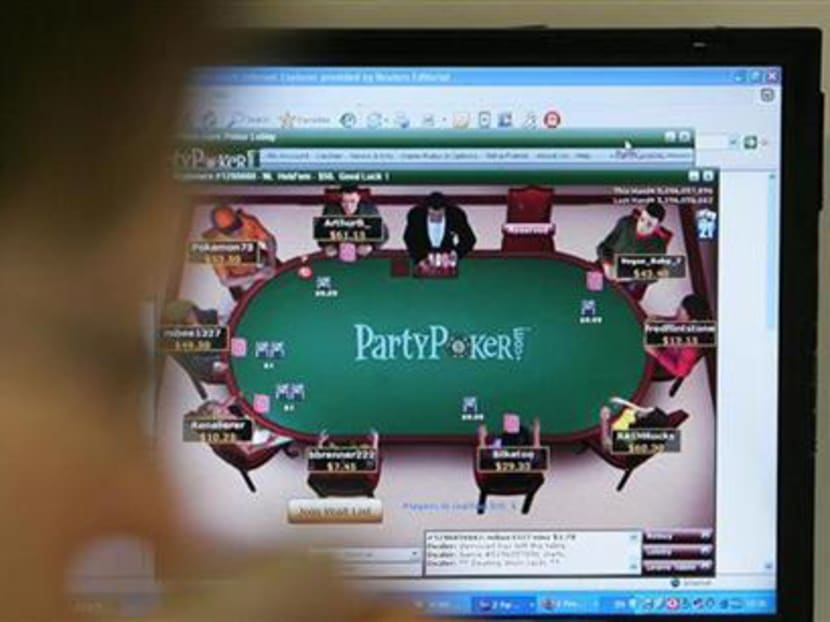Law proposed to ban remote gambling
SINGAPORE — Proposed laws to regulate gambling on the Internet or via the phone were introduced in Parliament yesterday, with a distinct focus on protecting the young from its harmful effects and penalties for various infringements being spelt out for the first time.
SINGAPORE — Proposed laws to regulate gambling on the Internet or via the phone were introduced in Parliament yesterday, with a distinct focus on protecting the young from its harmful effects and penalties for various infringements being spelt out for the first time.
Under the Bill, remote gambling will be banned unless it takes place through operators that were issued a certificate of exemption by the authorities.
Individuals who gamble online or via the phone face a fine of up to S$5,000 and six months’ jail, similar to current penalties for illegal gamblers under the Betting Act and the Common Gaming Houses Act.
Those who facilitate remote gambling can be fined between S$20,000 and S$200,000, and jailed for up to five years. Parties outside Singapore that provide remote gambling services to people here are not spared: They face fines of S$20,000 to S$500,000 and up to seven years in jail.
Addiction experts previously flagged the need to shield youth from online gambling and Second Minister for Home Affairs, Mr S Iswaran, has noted the risks it poses to the young and tech-savvy, as it is ubiquitous and easily accessible.
To this end, separate offences and heavier penalties will be created under Singapore’s proposed laws for parties who invite or facilitate people below 21 in remote gambling. They face fines of S$20,000 to S$300,000 and up to six years in jail. The same penalties apply to parties who employ or engage youth in the provision of remote gambling services, such as the distribution of prize money.
The duty to protect the young extends to any operator that is allowed to offer remote gambling: It must control the potential of remote gambling to cause harm to the young and vulnerable, as well as to society at large.
Globally, the remote gambling industry — comprising sports betting, online poker and virtual casinos — is booming and the Ministry of Home Affairs (MHA) said yesterday that current laws in Singapore do not expressly address remote gambling, having been enacted before the Internet era.
The proposed laws cover a comprehensive set of measures, comprising the blocking of websites and payments, as well as advertising bans on all forms of media, including print, broadcast, online and outdoor.
Other countries such as Hong Kong and Norway that have remote gambling restrictions have adopted some of these measures, but not the full suite.
When contacted by TODAY, Internet law expert Hannah Lim Yee Fen of the Nanyang Technological University welcomed the provisions tackling those who seek to groom youth in remote gambling. The proposed penalties would serve as both a deterrent and signal, she said.
Youth may be savvier than their parents in technology but, “many a time, they do not realise the full significance and impact of online gambling sites and need to be protected”.
Penalties facing those who facilitate remote gambling are also severe enough to “have some force”, added Associate Professor Lim.
Internet service providers and financial institutions will also play a role in curbing remote gambling here. The former could be required to block access to websites, including those that provide, facilitate or advertise remote gambling, while the latter could be issued a payment-blocking order to stop transactions involving a specific person or those who use merchant category codes typically associated with gambling transactions.
Internet service providers and financial institutions could incur hefty fines — up to a total of half a million dollars for each offence — if they fail to comply with the blocking orders.
The Association of Banks in Singapore (ABS) said it had been engaged by the MHA on the Remote Gambling Bill and supports the proposed laws.
“While the ABS is not opposed to the requirement to block payments to parties linked to unlawful gambling, any blocking requirement imposed must be operationally feasible and not result in undue regulatory and operational burdens being placed on the banking industry,” it said.
Internet service providers StarHub and M1 said they would cooperate with the authorities when the law takes effect. Both parties indicated that they had provided feedback to the MHA during the consultation phase of the framework.







